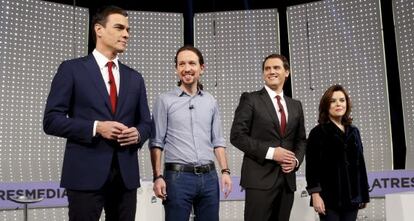Opposition leaders rail against deputy PM over corruption in TV debate
Socialist, Podemos and Ciudadanos candidates face PP number two in election encounter

With less than two weeks before the country goes to the polls, the leaders of Spain’s three main opposition parties last night outlined their programs and proposals in a televised debate alongside Deputy Prime Minister Soraya Sáenz de Santamaría, who defended her government’s record over the last four years.
Pedro Sánchez of the Socialist Party, Albert Rivera of Ciudadanos, and Pablo Iglesias of Podemos also found time to attack Santamaría – who had been sent to represent the ruling Popular Party in the place of Prime Minister Mariano Rajoy – highlighting several corruption scandals over recent years.
The old politics cannot begin a new political age” Ciudadanos leader Albert Rivera
In response, the PP’s number two focused on the government’s handling of the economic crisis since taking office in 2012. She also sought to play down her leader’s absence from the debate, which was organized by the Atresmedia media group: “The PP is a team; it’s not a personal project and anybody from the team could come to explain it,” she insisted.
Sáenz de Santamaría largely avoided entering into discussions with her three opponents. Rivera looked nervous, Sánchez uncomfortable, and only Iglesias seemed able to get his message over, particularly in the closing stages of the debate.
“The only way that Rajoy is leaving office is if the Socialists win,” said Sánchez, calling on the electorate to vote tactically, and claiming his party alone could “lead the country to change.”
Rivera, whose Ciudadanos party has, like Podemos, emerged as a major political force over the last year, highlighted the need for a new approach to Spanish politics: “The old politics cannot begin a new political age,” he said.
Iglesias was the most emotional of the four, and at times seemed more concerned with defeating the Socialists than the PP, accusing the party of saying one thing in opposition and then doing something else once in power.
The deputy prime minister defended her government’s handling of the crisis, particularly during its first year in office, when Spain came close to joining Portugal, Greece, and Ireland in having the IMF and European Central Bank intervene directly in restructuring their economies. “It’s easy to see that these three weren’t here four years ago,” she said at one point. She also highlighted their lack of experience in office: “Talking is easy, governing is very difficult.”
The four also discussed the EU assessment of Spain’s economic situation, which is due to be released this week and whose main points EL PAÍS advanced on Monday. The report calls for continued austerity measures and the completion of labor reforms after the December 20 elections.
Sánchez and Iglesias called for a renegotiation of the conditions imposed by the EU on Spain after the elections.
The three opposition candidates were in agreement over the PP’s perceived inability to address corruption in the party, a charge Sáenz de Santamaría denied. “We are ashamed about the corruption, and we have approved the most important plan since Spain returned to democracy to deal with it, and there will be no impunity,” she said.
Iglesias in particular attacked the PP’s record, describing it as “the corruption party” and mentioning scandals involving illegal payments to party members, former deputy PM Rodrigo Rato, and the Gürtel kickbacks-for-contracts scandal, among others.
Talking is easy, governing is very difficult” Deputy PM Soraya Sáenz de Santamaría
Rivera also rounded on Sáenz de Santamaría for her party’s record on corruption: “This is the reason Mr Rajoy is not here: he too received illegal payments.”
The four politicians also outlined their party’s views on independence for Catalonia. Rivera presented Ciudadanos, whose power base lies in the northeastern region, as the antidote to independence, and Sáenz de Santamaria called for “respect for the Constitution,” making it clear that her party did not support changes to the law or a referendum along the lines of the one held in Scotland last year. Sánchez said that Constitutional reform was needed before the issue could be resolved, while Iglesias argued in favor of a referendum that would allow Catalans to decide whether to remain part of Spain.
On the question of whether any of the four parties would support each other after the elections, Rivera said he would not back either the PP or the Socialists, offering instead, “an open government with independents and ministers from other parties.”
Sáenz de Santamaría argued in favor of a first-past-the-post solution, “to respect the wishes of the citizenry,” warning against what she called a “tripartite of losers.”
Of the four, Iglesias was the most successful in getting his final message across, calling on voters “not to forget” what had taken place over the last four years.







































